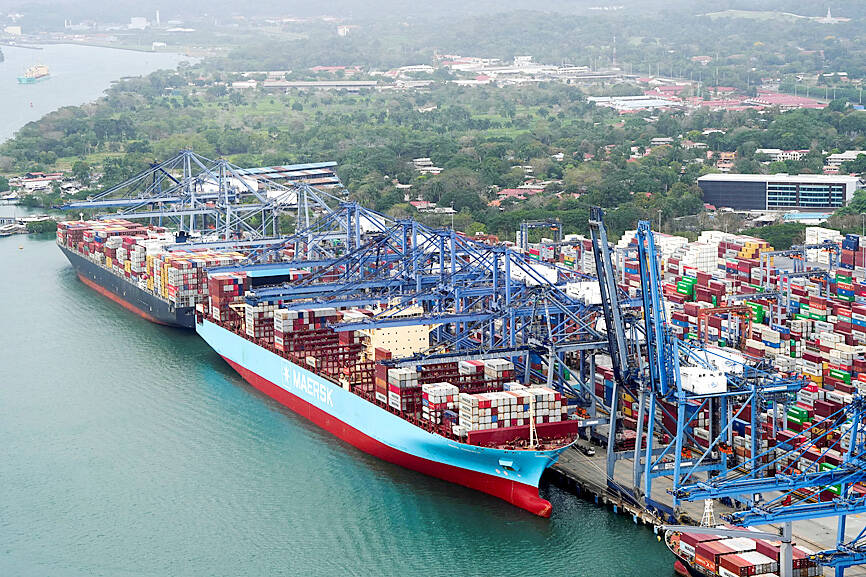Billionaire Li Ka-shing (李嘉誠), Hong Kong’s most famous tycoon, will not go ahead with the expected signing next week of a controversial deal to sell his Panama Canal ports to a consortium including BlackRock Inc, media reports said.
While Li’s flagship CK Hutchison Holdings Ltd will not sign the deal, which was expected to occur on Wednesday, it does not mean the sale has been called off, the South China Morning Post reported, citing a source it did not identify.
Significant details remain to be decided due to the complexity of the transaction, it said.

Photo: Reuters
Other local media outlets, including Sing Tao, also reported the agreement would not be signed.
The Balboa and Cristobal ports on either side of the 82km Panama Canal, which connects the Atlantic and Pacific oceans, form a key part of the deal involving a total of 43 CK Hutchison facilities. The Hong Kong conglomerate would net more than US$19 billion in cash, should the transaction go through.
It is the latest twist in one of the most geopolitically complicated deals ever for the 96-year-old business titan, given the two main users of the Panama canal are the US and China. Beijing’s concern was that the ports sale could threaten the country’s shipping and trade interests, while US President Donald Trump was celebrating it as the return of the canal back to US control from China.
The planned sale had highlighted the political risks for companies based in Greater China amid increasing trade tensions between the US and China.
That is despite CK Hutchison having limited exposure to both countries: The conglomerate is registered in the Cayman Islands and accrues only 12 percent of its revenue from Greater China, while Europe, Canada and Australia make up the bulk of the rest.
The move came after China told state-owned firms to hold off on any new collaboration with businesses linked to Li and his family, and authorities began looking into the transaction for potential security or antitrust breaches.
While CK Hutchison has kept ports in Hong Kong and mainland China out of the sale, the deal has been criticized by pro-Beijing newspaper Ta Kung Pao for “spineless groveling” to US pressure.
In a sign of state backing, the commentaries were reposted by China’s top office on Hong Kong affairs. Hong Kong Chief Executive John Lee (李家超) also weighed in, saying concerns over the deal deserved “serious attention” and vowing to handle the deal in accordance with the law and regulations.
Pro-Beijing media and people affiliated with Chinese authorities stepped up their criticism in the week ahead of the deadline for the signing of the definitive agreement. Ta Kung Pao ran articles almost every day denouncing the sale, while a spokesman for the Chinese Ministry of Foreign Affairs separately said Beijing opposes strong-arm tactics for economic gains.
“China has always firmly opposed the use of economic coercion and bullying to infringe upon the legitimate rights and interests of other countries,” ministry spokesman Guo Jiakun (郭嘉昆) said on Thursday.

TECH CLUSTER: The US company’s new office is in the Shalun Smart Green Energy Science City, a new AI industry base and cybersecurity hub in southern Taiwan US chip designer Advanced Micro Devices Inc (AMD) yesterday launched an office in Tainan’s Gueiren District (歸仁), marking a significant milestone in the development of southern Taiwan’s artificial intelligence (AI) industry, the Tainan City Government said in a statement. AMD Taiwan general manager Vincent Chern (陳民皓) presided over the opening ceremony for the company’s new office at the Shalun Smart Green Energy Science City (沙崙智慧綠能科學城), a new AI industry base and cybersecurity hub in southern Taiwan. Facilities in the new office include an information processing center, and a research and development (R&D) center, the Tainan Economic Development Bureau said. The Ministry

ADVERSARIES: The new list includes 11 entities in China and one in Taiwan, which is a local branch of Chinese cloud computing firm Inspur Group The US added dozens of entities to a trade blacklist on Tuesday, the US Department of Commerce said, in part to disrupt Beijing’s artificial intelligence (AI) and advanced computing capabilities. The action affects 80 entities from countries including China, the United Arab Emirates and Iran, with the commerce department citing their “activities contrary to US national security and foreign policy.” Those added to the “entity list” are restricted from obtaining US items and technologies without government authorization. “We will not allow adversaries to exploit American technology to bolster their own militaries and threaten American lives,” US Secretary of Commerce Howard Lutnick said. The entities

Minister of Finance Chuang Tsui-yun (莊翠雲) yesterday told lawmakers that she “would not speculate,” but a “response plan” has been prepared in case Taiwan is targeted by US President Donald Trump’s reciprocal tariffs, which are to be announced on Wednesday next week. The Trump administration, including US Secretary of the Treasury Scott Bessent, has said that much of the proposed reciprocal tariffs would focus on the 15 countries that have the highest trade surpluses with the US. Bessent has referred to those countries as the “dirty 15,” but has not named them. Last year, Taiwan’s US$73.9 billion trade surplus with the US

The Taipei International Cycle Show (Taipei Cycle) yesterday opened at the Taipei Nangang Exhibition Center, with the event’s organizer expecting a steady recovery in the industry this year following a tough last year. This year, 980 companies from 35 countries are participating in the annual bicycle trade show, showcasing technological breakthroughs and market development trends of the bicycle industry at 3,600 booths, the Taiwan External Trade Development Council (TAITRA, 外貿協會) said in a statement. Under the theme “Ride the Revolution,” the exhibition has attracted more than 3,500 international buyers from 80 countries to preregister for the four-day event, which is expected to